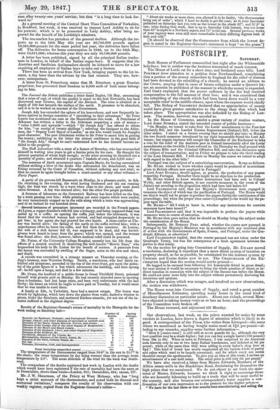POSTSCRIPT.
SATURDAY.
Both Houses of Parliament reassembled last night after the Whitsuntide holydays ; but in neither was the business transacted of much interest.
The House of Lords sat for a short time, and furthered some bills. Lord PORTMAN drew attention to a petition from Newfoundland, complaining that a portion of the money subscribed in England for the relief of distress had been devoted to the rebuilding of a church: he moved an address to the Crown, praying that in cases of future collection under a Queen's let- ter, an account be published of the manner in which the money is expended. Earl GREY explained, that the poorer sufferers by the fire had received compensation to the full amount of their loss•' and it was considered that the rebuilding of the church which had been burnt down would be a very acceptable relief to the middle classes, upon whom the expense would chiefly fall. The Bishop of SALISBURY declared that no appropriation of money could have given greater satisfaction to the clergy than that which had taken place. The appropriation was also defended by the Bishop of Low- pow. The motion, however, was acceded to.
In the House of Commons, amidst a great variety of routine matters, Lord JOHN RUSSELL stated the intended course of public business-
" On Monday, we intend to take first the Lords' amendments to the Poor-law (Ireland) Bill, and the Landed Estates Improvement (Ireland) Bill, before the other orders. I stated on a former evening that we should also take on Monday the two Scotch measures introduced by my right honourable friend the Lord Ad- vocate; but urgent business will compel the Chancellor of the Exchequer to take a vote for the relief of the destitute poor in Ireland immediately after the Lords.' amendments on the two bills I have referred to. On Thursday we shall proceed with the Prisons Bills and the Criminal Offenders Bill, and take the discussion upon the subject of transportation; and on Friday we propose to take the third reading of the Loan Discount Bill. I will state on Monday the coarse we intend to adopt with regard to the other bills."
Portugal was the subject of a catechizing conversation. It ran as follow/4 Mr. RUNE wished to know whether copies would be produced of instructions given to British officers now employed in Portugal? Lord JOHN RUSSELL should oppose, at present, the production of any papers respecting Portugal. Hereafter there might be no objection to the production. Mr. HOME wished to know whether instructions had been sent to Colonel Wylde, and other British agents, to use coercive measures in the event of the Junta's not acceding to the proposition which had been laid before it? Lord PALMERSTON said, that her Majesty's Government were engaged in measures the object of which was the pacification of Portugal. The House would see that it would not be proper to produce the papers during the continuance of the proceedings; but when the proper time came—(Laughter)--he would lay the pa- pers upon the table. Mr. HUME—" All I wish to know is, whether any instructions for coercive measures have been issued?"
Lord PALMERSTON said that it was impossible to produce the papers while measures were in course of execution.
Mr. HOME then gave notice, that he should on Monday bring the subject under the consideration of the House.
Subsequently, Sir ROBERT PEEL asked, whether the course now pursued in Portugal by her Majesty's Ministers was in accordance with any combined plan of action with the Governments of Spain, France, and Portugal, under the Qua- druple Alliance, or otherwise? Lord PALMERSTON replied, that the course pursued Was not taken under the Quadruple Treaty, but was the consequence of a fresh agreement between the parties to that treaty.
On the motion for going into Committee of Supply, Mr. EWART moved a resolution, declaring it expedient that a more direct system of taxation on property should, as far as possible, be substituted for the indirect system by Customs and Excise duties now in use. The CHANCELLOR of the EX- CHEQUER hoped that the motion would not be pressed—
He begged to be excused from following his honourable friend in great detail; for next session it would be necessary to bring the whole question of direct or in- direct taxation in connexion with the subject of the Income-tax before the House. He could not enter more fully into the subject without prematurely disclosing his intentions and opinions.
After a discussion which was meagre, and involved no new observations, the motion was withdrawn.
The House went into Committee of Supply, and voted a great number of Miscellaneous Estimates, spending many hours in the usual kind of desultory discussion on particular points. About one o'clock, several Mem- bers objected to taking money-votes at so late an hour; and the proceedings of the Committee were broken off.
The House resumed, and adjourned till Monday.


























 Previous page
Previous page